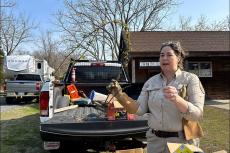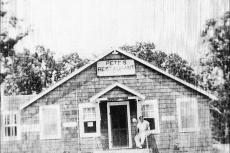The Southampton Town Board, using money from the community preservation fund, voted last week to purchase two parcels in Shinnecock Hills, in an area believed to be ancient burial grounds of the Shinnecock Indian Nation. Members and supporters of the Nation had lodged strong protests over housing construction at a nearby site.
The moment was celebrated, not only for the acquisition of the land but also for the board’s introduction of a long sought-after Graves Protection Act unless an archaeological survey can prove that no Shinnecock graves are being disturbed. A public hearing will be held on the proposed laws on March 24 at 6 p.m. That same evening there will be another hearing on a related six-month moratorium on certain development actions in Shinnecock Hills.
“We’ve very pleased that we are working with the town government to enact some very serious legislation so that this doesn’t come up again,” Bryan Polite, the Shinnecock tribal chairman, said on Tuesday.
However, the land purchase and introduction of the long-awaited law, which will make it illegal to disturb a burial site that is discovered during construction, is bittersweet. The property at 513 Montauk Highway in the Sugar Loaf area, where a large group gathered in January to protest a new house being built on land designated by New York State and Southampton Town as a critical environmental area, was not part of the C.P.F. deal. Construction was too far along. No human remains were found, but there was also never any formal search.
Jim Burke, the town attorney, and Lisa Kombrink, the town’s new C.P.F. manager, were able to reach an agreement to purchase 3.3 acres of land adjacent to the initial property in question. The price tag: $2.2 million.
The purchase assures the preservation of two parcels that could have yielded three building lots. The first, at 517 Montauk Highway, a 1.2-acre neighbor of 513 whose owner already had a building permit, will be purchased for $750,000. The second, on the corner of Sugar Loaf and Ridge Roads, will cost $1.45 million. That 2.1-acre lot could have been split into two building lots, Ms. Kombrink said.
Steve Graziano, the developer, has insisted all along that he knew nothing of the land being the site of ancient burials. The properties are owned by JLS Land Development L.L.C. and EMC & MTG Corp., as the contract vendee for the larger of the two properties. A simultaneous closing was scheduled to happen yesterday.
“If it wasn’t for those protests, I don’t know that we would be here discussing this,” Supervisor Jay Schneiderman said at the Feb. 25 public hearing on the purchase.
Shane Weeks, the co-chairman of the Shinnecocks’ Graves Protection Warrior Society and member of the joint Shinnecock-Southampton Town Cultural Stewardship Committee, called the land acquisition a huge step forward. The support from both the audience and the town board was unanimous. One woman, a neighbor of the Shinnecocks since the 1980s, said she was happy to see her tax dollars put to good use. “So I’m asking you, please, to take my two-percent I keep paying and all of my taxes and put the Shinnecocks on the top of the acquisition list.”
That same evening, Mr. Schneiderman introduced the Graves Protection Act, establishing, he said, “a strict set of steps” to be followed when human remains are unearthed during construction, something not covered by state law. If the new law is passed, construction will have to stop if bones are found anywhere in Southampton Town. The police will be notified and the Suffolk County Medical Examiner’s office will determine if they are ancestral remains. If so, the Shinnecocks will be brought in, and the town will try to acquire the property through the C.P.F.
Mr. Schneiderman said he was “aghast” when human remains were found in 2018 on a Hawthorne Road property while a foundation was being dug, and told the building inspector to issue a stop-work order. There were no legal grounds for him to do so, he said, though he ordered it done anyway. The property owner and the town were eventually able to reach agreement. and the town purchased the parcel for $450,000. “I don’t want to see that situation again,” Mr. Schneiderman said.
“What is surprising to me,” he said, “is that even though the state recognizes this as an area of archaeological significance, cultural significance, and sensitivity, that within the town you can go dig up a single-family home foundation without having to do any archaeology.”
“It’s hard for me to believe, but that is the case . . . that is wrong, and I’d like to fix that.” It will take some time, the supervisor said, to codify, hence the moratorium. It will mean no building permits for any excavation in the Sugar Loaf area will be issued unless the owners have completed an archaeological review, including the use of ground-penetrating radar, and no bones or artifacts are found on the property. In the Fort Hill area, the moratorium will apply to any new home construction.
“I find it appalling that we are one of four states without a state law that guarantees these rights,” said Nick Michelli of Water Mill during the hearing on the land purchase. He said he would “ask current and future senators — Tommy John — to take this up in Albany,” referring to Town Councilman Tommy John Schiavoni, who is running for the State Senate.
Mr. Polite said he was sad that the property at 513 Montauk Highway could not be preserved, but that “monumental work” was being undertaken at the town level. “We are happy at the outpouring of support that we’ve gotten from the local community.”



